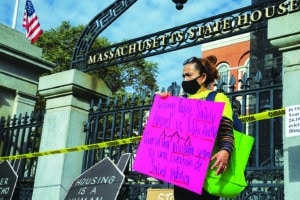
An activist rallies on the State House steps in support of Massachusetts renters in October 2021. Photo by Sam Doran | State House News Service/File
A new poll of Massachusetts voters suggests an increasing share may be open to the return of rent control, so long as it’s not a statewide mandate.
A survey of 854 likely voters by the respected MassINC Polling Group, commissioned by the building trades-led Responsible Development Coalition, asked whether voters backed the idea of letting individual towns and cities pursue rent control policies.
The question was part of a larger survey on voters’ attitudes towards wage theft, construction labor topics and voters’ priorities ahead of this fall’s gubernatorial election.
The poll asked two slightly different versions of the same question – whether or not the state legislature should lift the ban on local-option rent control policies – to different halves of the respondent pool.
When just asked whether they supported the return of local-option rent control, 25 percent somewhat supported the idea and 37 percent strongly supported it. A further 10 percent somewhat opposed it and 22 percent strongly opposed it.
When reminded that the policies would apply to privately-owned rental units, however, support noticeably moderated: only 33 percent strongly supported the idea and only 19 percent somewhat supported it. Meanwhile, the ranks of those strongly opposed swelled to 31 percent and those somewhat opposed stayed constant.
The results compare with a January poll by MassINC that showed the state was more closely divided on rent control. That survey showed 42 percent backed the idea and 48 opposed, including 36 percent of Democratic primary voters and 50 percent of independent voters. That question had framed the issue in a similarly neutral fashion to the first formulation in the Responsible Development Coalition’s poll.
The poll also found that most voters weren’t aware of wage theft but supported the idea of making it a felony or making contractors responsible if any of their subcontractors committed wage theft.
Nearly two-thirds of the voters surveyed also said they wanted the legislature to prioritize dealing with the cost of living in Massachusetts, while 6 in 10 said the cost of housing should be a top priority. Fifty-eight percent said the cost of food should be a top focus along with 55 percent who named inflation and another 54 percent who said “wages not keeping up with costs” should be a focus. Only 49 percent cited gas prices and only 37 percent cited the availability of jobs as important concerns for the legislature, with those two issues also generating the largest share by far of respondents who said they shouldn’t be a priority at all: 16 percent and 19 percent, respectively.






